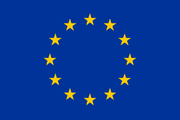| |||
| Anthem | "Ode to Joy" | ||
| Capital | Constantinople | ||
| Largest city | Rome | ||
| Language | Danish, Dutch, English, French, German, Greek, Italian, Latin, Lithuanian, Polish, Portuguese, Spanish, Swedish | ||
| Religion main |
Christianity | ||
| others | Islam, Judaism | ||
| Ethnic Group | Europeans | ||
| Demonym | European | ||
| Government | Federal Supranational Union | ||
| President of the European Council | Michael X of The Roman Empire | ||
| President of the Commission | José Manuel Barroso | ||
| Population | 680,000,000 | ||
| Established | 1952 | ||
| Currency | Euro | ||
| Member states | United Kingdom France Netherlands Flanders Spain Portugal Roman Empire Holy Roman Empire Denmark Sweden Poland-Lithuania | ||
The European Union (EU) is an economic and political union of 11 member states that are located primarily in Europe. The EU operates through a system of supranational independent institutions and intergovernmental negotiated decisions by the member states. Institutions of the EU include the European Commission, the Council of the European Union, the European Council, the Court of Justice of the European Union, the European Central Bank, the Court of Auditors, and the European Parliament. The European Parliament is elected every five years by EU citizens. The EU's capital is Constantinople.
The EU traces its origins from the European Coal and Steel Community (ECSC) and the European Economic Community (EEC), formed by the Inner Six countries in 1951 and 1958, respectively. In the intervening years the community and its successors have grown in size by the accession of new member states and in power by the addition of policy areas to its remit. The Maastricht Treaty established the European Union under its current name in 1993. The latest major amendment to the constitutional basis of the EU, the Treaty of Lisbon, came into force in 2009. EU policies aim to ensure the free movement of people, goods, services, and capital, enact legislation in justice and home affairs, and maintain common policies on trade, agriculture, fisheries, and regional development.
More than 680 million people live within it, together it constitutes more 8% of the world population. It has a total GDP of more than 23 trillion US dollars, which makes it by far the world's largest economy. It has global influence and military might and is considered a potential superpower, though it is not a nation.
Member states[]
A member state of the European Union is a state that is party to treaties of the European Union (EU) and thereby subject to the privileges and obligations of EU membership. Unlike the membership of an international organisation, EU membership places each member under binding laws in exchange for representation in the EU's legislative and judicial institutions. On the other hand, EU states retain considerable autonomy compared to the constituent states of a federation (such as a U.S. state), maintaining their national military and foreign policy (where they have not agreed to European action in these areas). There are 11 current members.
Current members[]
| Flag | Nation | Joined | Population | Area (sq km) | Currency | Council votes | EP seats | Languages |
|---|---|---|---|---|---|---|---|---|
| Denmark | 1973 | 5,600,000 | 2,220,093 | Euro | 10 | 20 | Danish, Norwegian | |
| Flanders | 2013 | 10,000,000 | 13,522 | Euro | 20 | 40 | Dutch | |
| France | Founding member | 65,000,000 | 600,000 | Euro | 40 | 80 | French | |
| Holy Roman Empire | Founding member | 100,000,000 | 570,000 | Euro | 40 | 80 | German | |
| Netherlands | Founding member | 16,000,000 | 41,543 | Euro | 20 | 40 | Dutch | |
| Poland-Lithuania | 2004 | 100,000,000 | 1,311,000 | Polish złoty | 40 | 80 | Polish, Lithuanian | |
| Portugal | 1986 | 10,487,000 | 92,212 | Euro | 20 | 40 | Portuguese | |
| Roman Empire | Founding member | 270,000,000 | 2,116,000 | Roman augusta | 60 | 120 | Latin, Greek, Italian, Georgian | |
| Spain | 1986 | 46,704,314 | 502,992 | Euro | 40 | 80 | Spanish | |
| Sweden | 1995 | 9,555,000 | 449,964 | Euro | 20 | 40 | Swedish | |
| United Kingdom | 1973 | 70,000,000 | 315,093 | Pound sterling | 40 | 80 | English | |
| Russia | 2013 | 130,000,000 | 15,500,000 | Russian rubble | 50 | 100 | Russian |
Other states[]
| Flag | Nation | Status | Population | Area (sq km) | Currency | Languages | Expected accession |
|---|---|---|---|---|---|---|---|
| Australia | Candidate | 22,900,000 | 7,617,930 | Australian dollar | English | 2014-2015 (earliest possible) | |
| Canada | Applicate | 33,476,000 | 9,984,670 | Canadian dollar | English, French | 2015-2016 (earliest possible) | |
| Morocco | Rejected | 70,000,000 | 2,400,000 | Moroccan dirham | Arabic, Berber | Never | |
| Kenopia | Rejected | 250,000,000 | 4,900,000 | Kenopian dinar | Arabic | Never |

